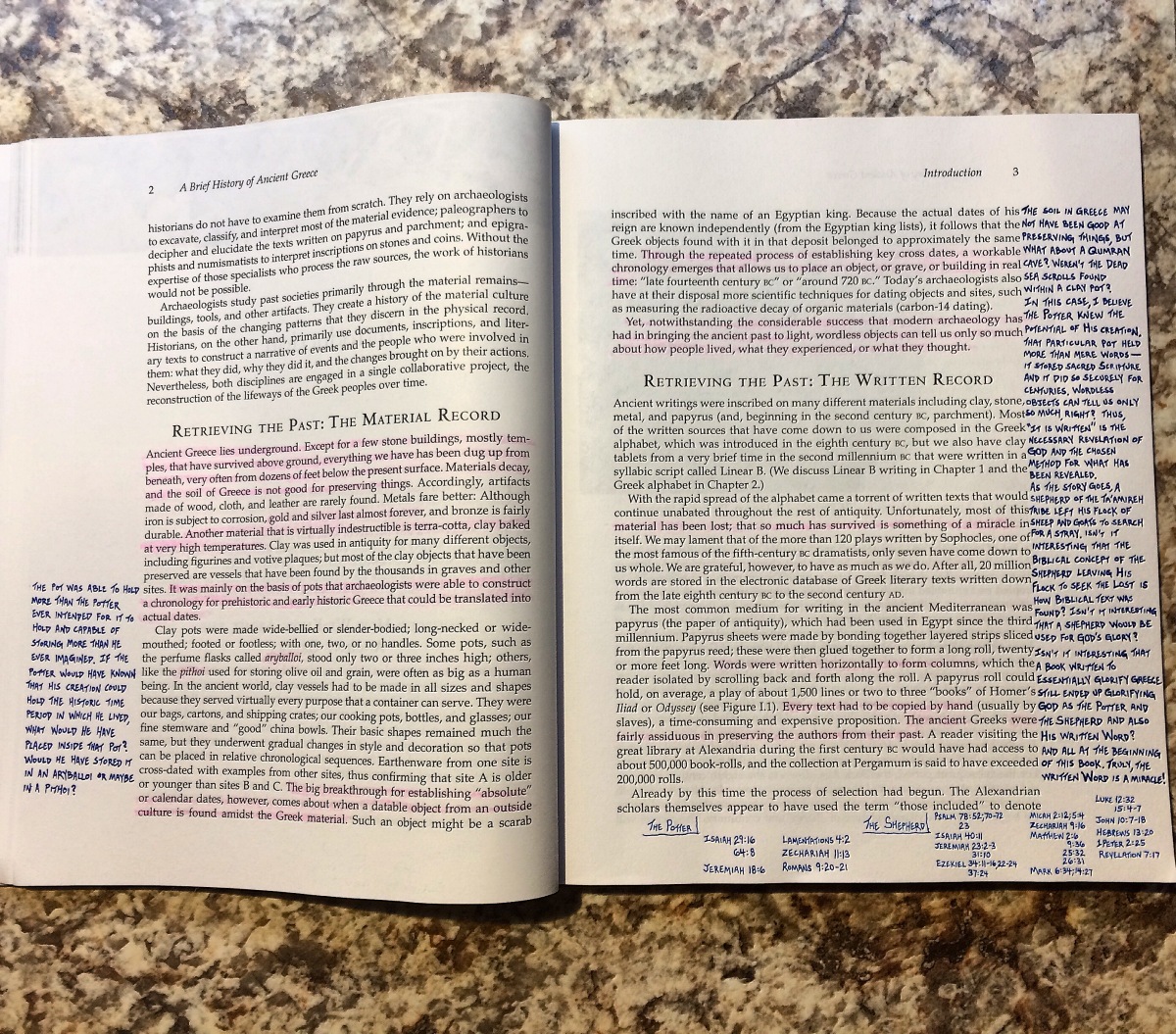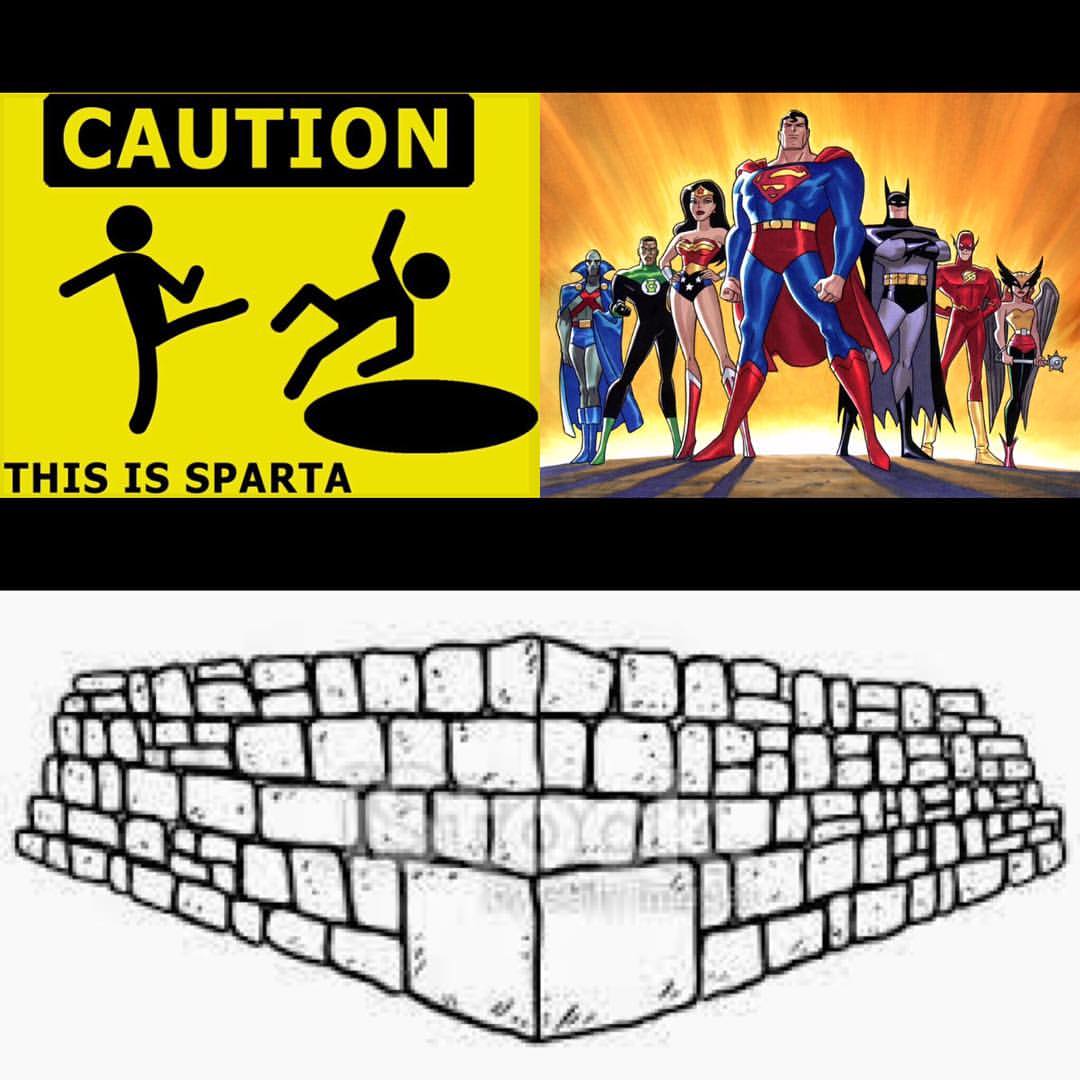Genesis 28:10 – 30:24
JACOB’S LADDER
(Genesis 28:10-22)
While Esau was attempting to gain his parents’ approval by marrying Ishmael’s daughter, Genesis 28:10-11 informs us that Jacob had left Beersheba and started his journey to Haran but eventually stopped to camp at some location when the sun went down. As Jacob slept, 28:12 says that in a dream, he saw a “ladder”. That word could be translated as such from Hebrew, but because it also means something that is raised up, it could also be translated as a “staircase”. In fact, given what we already know regarding the Tower of Babel being related to a ziggurat, and how the purpose of the ziggurat was to act as the connecting gate to GOD, I believe the raised up structure between Heaven and earth that Jacob witnessed was probably a staircase similar to a ziggurat. After all, the prideful people who attempted to get to Heaven via the Tower of Babel could not get to Heaven, and yet Jacob, who is sleeping flat on the ground, receives a vision from Heaven, showcasing how only the Lord is capable of making this connection. Regardless, this “ladder” or “staircase” stretched from the ground of the earth all the way to the heavens where the stars were seen. Jacob witnessed some angels descending from the heavens to earth and other angels ascending from the earth to the heavens. And 28:13 says that at the top stood the “Lord” יְהֹוָה [H3068] YHWH. And so man is unable to reach Heaven via their efforts of a tower or a stairway, but the Lord is able to come down to man. In 28:13-14, the Lord promises Jacob that the land belongs to him, his descendants will be as numerous as the dust of the earth, and that all families of the earth will be blessed through his descendants. If those promises sound familiar, it’s because all those promises to Jacob echo earlier promises the Lord gave to both Abraham and Isaac (12:2-3,7; 13:14-17; 17:7-8; 18:18; 22:17-18; 26:3-4).
Within the one verse of 28:15, the Lord states four promises in that the He is with Jacob, He will protect Jacob wherever he goes, He will bring Jacob back to the land he’s now on, and He will not leave Jacob until He has done what He has promised. When YHWH says, “I am with you”, it reminds me of what Jesus will later say to His disciples prior to His ascension in Heaven in Matthew 28:20 when He says, “I am with you always, even to the end of the age.” But why wouldn’t He be with His disciples just as He had been with Jacob? After all, Hebrews 13:8 says, “Jesus Christ is the same yesterday and today and forever.” In fact, in John 1:51, while Jesus speaks to Nathanael, He declares that He is the connection in this story with Jacob when He says, “Truly, truly, I say to you, you will see the heavens opened and the angels of God ascending and descending on the Son of Man.” Therefore, this event with Jacob foreshadows how Jesus is the connection to Heaven and the only way to get to Heaven. And of course, for this reason, Jesus will later say in John 14:6, “I am the way, and the truth, and the life; no one comes to the Father but through Me.”
Now, when the Lord said He would bring Jacob back to the land, Jacob had no way of knowing that the Lord’s promise would not be fulfilled for another 20 years. However, the promise that the Lord would not leave Jacob until He had done what He promised is interesting because it seems to imply that at some point, the Lord’s favor or blessing will depart from Jacob after the Lord’s promises have been fulfilled. Well, I believe that moment will be seen later on in the great famine which will force Jacob to follow the Lord to Egypt, which we will see starting in Genesis 42.
The conclusion of Jacob’s vision jolted him awake, the fear of the Lord came upon him, he considered the location to be “awesome”, that it was the house of GOD, and the very gate of Heaven (28:16-17). So, what did Jacob do in response to his vision? In 28:18-22, rising early in the morning, Jacob took the stone that he used as a pillow, set it up as a pillar, and then poured oil on top of it, seemingly anointing the location. This action is interesting because this is the first time anyone has performed this anointing action with oil thus far in our chronological journey. So, how did Jacob learn to do this? Was he instructed to do this by Isaac or did he merely watch someone else do it and he is now copying that person’s behavior? This passage doesn’t say, but it seems to have been a Canaanite practice, which GOD will later prohibit in Deuteronomy 16:22: “You shall not set up for yourself a sacred pillar which the Lord your God hates.” Whatever the case may be, GOD will later clarify in great detail as to what to do and why to do certain things within the Mosaic Law. Noteworthy is the fact that while Jacob continues this practice during his stay in Paddan Aram (31:45,51-52) and after he returns to Canaan (35:14,20), following his next encounter with GOD at Peniel (32:22-32), he will construct altars (33:20; 35:1-7), just as Abraham (12:7-8; 13:4,18; 22:9) and Isaac (26:25) had done, with one of these altars being located at Bethel. This shift to making altars may indicate that Jacob undergoes a deep spiritual experience and a personal encounter of correction, but we don’t know for certain. Regardless, Jacob’s motive is pure and his intentions are good in that he truly wants to serve the Lord. The truth of the matter is that Jacob only knew what had been revealed to him, and because the Bible’s salvation story is a progressive revelation which culminates in Christ, Jacob truly did not know much by which the Lord would judge him.
After anointing the pillar with oil, Jacob called the name of the place Bethel, which means “house of God”, and then he made a vow to the Lord. But what is a vow? Vows are binding promises made to GOD while awaiting GOD’s help (Numbers 21:2; 1Samuel 1:11). When GOD’s answer comes, worshipers fulfill their vow by performing what they have promised (1Samuel 1:21; Acts 21:23-24). Later on, Mosaic regulations will address how and by whom vows are to be implemented (Leviticus 7:16; 22:17-25; 23:38; 27:2-11; Numbers 30; Deuteronomy 12:5-28). And since vows are intended to distinguish GOD’s faithful worshipers (Psalm 116:14,17-18), Scripture condemns rash or unfulfilled vows (Numbers 30:2; Deuteronomy 23:21-23; Proverbs 20:25; Ecclesiastes 5:5-6; Judges 11:30-39). But in this current story, Jacob makes a vow that if GOD does what He says, when Jacob returns in safety, “21 then the Lord will be my God. 22 This stone, which I have set up as a pillar, will be God’s house, and of all that You give me I will surely give a tenth to You” (Genesis 28:21-22). And so yet again, this practice of tithing to the Lord can be seen, and this practice will continue with the future generations of the Israelites. But if we pay attention to details, we will notice that Jacob says YHWH will be “my God”. Why is that significant? Because when Jacob was in the process of deceiving his father in 27:20, Isaac asked how the meal arrived to him so quickly, and Jacob said, “the Lord your God caused it to happen to me.” So, at first, Jacob referred to the Lord as Isaac’s GOD, but now that he encountered the Lord for himself, he promises that the Lord will be his GOD if the Lord brings him back in safety. It’s amazing what a personal encounter with the Lord can do for a person, isn’t it?
- In 28:11, it is written that Jacob used a stone as a pillow for his head while sleeping in the wilderness. When was the last time you used a stone for a pillow or slept outside in the elements? I recall even as recent as last night how I woke up because I thought my pillow was lumpy and uncomfortable even though my pillow is soft and not hard like a stone. I also sleep on a soft bed, but Jacob slept on hard ground. I felt conviction in that moment while reading his story. But what about you? When was the last time you paused in your busy life to reflect on all the blessings you take for granted? Truly, how much do we possess that we simply don’t deserve? Are you truly grateful? Lord, thank You for my blessings that I truly don’t deserve.
- Jacob used a stone as a pillow for his head. When a person is willing to use a stone as a pillow, that person is either harder than woodpecker lips or that person is obviously exhausted. But Jacob – not the outdoorsman (25:27) – fled for his life and ran from his mistakes. Running from your mistakes can lead you to feeling drained and in need of a reset. But what about you? Do you keep running from the mistakes in your life? Are you still running from your mistakes? Do you need to rest in the knowledge of GOD’s saving grace? Take notice of where Jacob rested. On The Rock. You may have mistakes in life, but when you decide to rest on the Rock (Christ Jesus), you’ll be ready for an encounter with the Lord. In fact, this is why Peter says in 1Peter 5:6-7, “6 Therefore humble yourselves under the mighty hand of God, that He may exalt you at the proper time, 7 casting all your anxiety on Him, because He cares for you.” For this reason, Jesus will later say in John 15:5, “apart from Me you can do nothing.” So, are you ready to rest on the Rock?
- In Jacob’s sleep, GOD gave him a personal encounter through a vision. Jacob’s response to this vision is interesting: he was afraid. Perhaps the best parallel to this situation is when Adam hid in the garden because he had been afraid due to the realization of sin in his life (Genesis 3:10). When Jacob woke up, he realized for the first time that he had always been asleep and unaware of the Lord’s presence in his life. And so it is with everyone else in life: we are all asleep until we wake up to the Truth of the Lord in our lives. It was not enough for him to be Abraham’s grandson or Isaac’s son; Jacob had to establish his own personal relationship with GOD (Matthew 3:9; Luke 3:8). It is not enough to hear wonderful stories about Christians in the world or even in your own family; you need to become part of the story yourself (Galatians 3:6-7). Are you asleep or are you awake? Where is the Lord right now?
- In 28:15, when the Lord promised Jacob He would bring him back to the land he was on, Jacob didn’t realize that the Lord’s promise wouldn’t be fulfilled until about 20 years later. But what about you? Is there a promise you’re waiting on? How long has it been? How long are you willing to wait? What if GOD’s perfect timing requires you to wait a little longer?
- In 28:16, Jacob started with a thought-provoking confession: “Surely the Lord is in this place, and I did not know it.” Why didn’t Jacob realize that the Lord was at that place? Did he consider that location to be too common? Did he believe that the ordinary couldn’t become extraordinary? But what about you? How many common or ordinary locations do you take for granted? Isn’t the Lord also at those locations? And if the Lord is there, how can it be common or ordinary? Wouldn’t that location be extraordinary? I don’t know about you, but the location that comes to my mind is my current place of employment. I often think of my job as being so common, ordinary, mundane, meaningless, and without purpose that this story filled me with conviction. I need to have the mindset while at work that the Lord is there and so that place cannot be ordinary. I should expect an encounter with the Lord no matter where I happen to be. But what about you? What place do you take for granted as being too common or ordinary for an encounter with the Lord?
- In 28:18-19, Jacob took the stone — the hard and uncomfortable part of his life — and dedicated it to the Lord. What are the hard and uncomfortable parts in your life you need to dedicate to the Lord as you strive to know GOD better and grow closer in relationship with Him? Jacob dedicated the hard part of his life and called that place the “house of God”. Do you realize that the hardest parts of your life are where the best experiences of worship can be discovered?
- In 28:21, due to his personal encounter with the Lord, Jacob vows that the Lord will become his GOD and no longer merely the GOD of his father. Do you remember your personal encounter and what changed your mind to proclaim the Lord as your GOD rather than merely the GOD of your parents? What was that encounter? What did you experience?
THE BIRTHING OLYMPICS
(Genesis 29:1 – 30:24)
In Genesis 29:1-2, Jacob, finally reaching the end of his journey “to the land of the sons of the east”, sees the same well that Abraham’s faithful servant Eliezer had seen many years ago (24:11). However, whereas Eliezer had prayed for guidance, Jacob does not. The description of “sons of the east” is an unusual way to refer to the inhabitants of Paddan Aram in northwest Mesopotamia. However, throughout the book of Genesis, the “east” is often associated with those who are expelled or move away from GOD’s presence (3:23-24; 4:16; 21:14; 25:6). Thus, this brief comment is a possible indicator that Jacob’s relatives do not worship the one true GOD (YHWH). In fact, we will later see that Laban does not (31:19).
In 29:4-8, seeing a large stone over the mouth of the well, and men with flocks of sheep and goats standing idly by the well, Jacob asks the men where they are from. After discovering they are from Haran, he asks them if they know “Laban the son of Nahor”. Now, this is interesting because Laban’s father is Bethuel and his grandfather is Nahor (24:24). And so yet again, Scripture passes over Bethuel for some reason unbeknownst to us (24:29,55). But after confirming that they did in fact know Laban and that he is doing well, they point out that his daughter Rachel is actually walking toward the well with sheep at that very moment. Jacob, noticing that it was still in the middle of the day, determined that it was not time for the livestock to be gathered and so he said, “Water the sheep, and go, pasture them.” But they responded, “We cannot, until all the flocks are gathered, and they roll the stone from the mouth of the well; then we water the sheep.”
Rachel then appears at the perfect time for Jacob just as Rebekah had appeared at the perfect time for Eliezer (24:15). But the fact that it was the middle of the day made this an unusual scenario because, as learned earlier in 24:11, evening time is when the women go out to draw water, not in the middle of the day. So, why was Rachel there? Why were the other men there? I don’t know, but they all had animals. Perhaps this was the time when animals were to receive water and later on in the evening is when the women will come to get water for households.
In 29:9-14, when Rachel arrived at the well, Jacob looked at her and Laban’s sheep with her (for Scripture states she was a shepherdess), and Jacob decided to roll the stone from the mouth of the well and then provide water for her flock. Thus, this is a role-reversal from the story of Rebekah. Whereas Rebekah had provided water for Eliezer’s camels (24:19-20), Jacob is now providing water for Rachel’s sheep. But didn’t the men nearby state that the stone couldn’t be removed until all flocks had gathered? So, why did Jacob move the stone and provide water for Rachel’s sheep? Perhaps with the arrival of Rachel, all flocks had gathered. Further, the men stated that the shepherd would move the stone. Perhaps Rachel (a shepherdess) had intended to move the stone yet Jacob moved it for her. Some commentators suggest that Jacob’s action might have been to show his strength and prove that he would be an asset to Laban’s family. Regardless, after watering her sheep, “Jacob kissed Rachel, and lifted his voice and wept” and told her that he was a relative of her father, and that he was Rebekah’s son. After hearing this, she ran and told Laban – just as Rebekah had done in 24:28-29. And just as it happened in the story of Rebekah, Laban came to investigate this time also. Laban then greeted Jacob and invited him to his house. Once in Laban’s home, “he related to Laban all these things”. Afterwards, Laban said to him, “Surely you are my bone and my flesh.” And then Jacob stayed with him for a month.
Now, I find 29:13-14 interesting because there seems to be two possible interpretations for these verses concerning the conversation between Laban and Jacob, and it’s possible that both could be true. The first interpretation is that when Scripture states Jacob “related to Laban all these things”, it could mean that Jacob merely shared the details of how he was related to Laban. However, the second interpretation could imply that Jacob told Laban the entire story as to why he was there, just as Eliezer had done when he visited (24:33-49). But if Jacob explained his entire story, then Laban’s response of “Surely you are my bone and my flesh” might mean more than the mere recognition of being related; rather, Laban could have implied that because Jacob was a man determined to be blessed by any means, then Laban saw a lot of himself in Jacob and he gave Jacob his approval. However, because Scripture does not state as much, it’s best not to read into the text what isn’t clearly stated unless other evidence proves the point and that point provides reason for something that happens within the main storyline. In this case, both interpretations could be true and they don’t affect the main story either way.
In 29:15, Laban says to Jacob, “Because you are my relative, should you therefore serve me for nothing? Tell me, what shall your wages be?” Now, keep in mind that 29:14 informed us that Jacob had stayed with Laban and served him for an entire month before Laban spoke those words to Jacob. So, Laban had already used Jacob for labor for an entire month without compensating him for his labor. In an alpha male dominant display of power, Laban took advantage of Jacob’s desperate situation and treated him as if he were a servant, apparently only providing him with the food he needed to live. So, why did Jacob endure such treatment for an entire month? Well, not only had Rebekah not yet sent for him to return home (27:45), but 29:16-18 informs us that Jacob became infatuated with Laban’s younger daughter, Rachel, and desired to have her as his wife. Thus, Laban and Jacob had both been scheming as to how to receive a blessing. However, because of Jacob’s Aperture Appetite for Rachel, he didn’t notice Laban’s deception in the blurred background.
In 29:17, Scripture informs us that “Leah’s eyes were weak, but Rachel was beautiful of form and face.” The word “weak” is the Hebrew word רַךְ [H7390] raḵ (rak), which means tender, soft, delicate, weak, or frail, and has the implications elsewhere in Scripture of being timid, fearful, or fainthearted. Though the description is brief, it seems to imply that Jacob found Rachel to be more attractive in both form and face. Some people have misinterpreted this verse to mean that Leah had a lazy eye, but the Hebrew doesn’t state this to be the case.
In 29:18, responding to Laban, Jacob presented an offer to work for him seven years to be able to marry Rachel. But why did he offer to serve for seven years? That’s a long time. Well, as we learned earlier in our chronological study, a bride price was paid by the groom to the family of the bride as surety that the marriage would take place. However, Jacob didn’t own anything and so he had nothing to offer except his labor. In 29:19, Laban agreed. And then 29:20 says, “So Jacob served seven years for Rachel and they seemed to him but a few days because of his love for her.”
However, when the time had come for Jacob to receive Rachel as his wife, Laban prepared a feast during the day (29:22), waited until evening, and then sneaked Leah into Jacob’s place under the cover of darkness, and Jacob consummated the marriage with her (29:23). And because this occurred after an entire day of feasting, it might be possible that Jacob had been somewhat inebriated, though Scripture doesn’t state that to be the case. Unfortunately, Jacob didn’t discover that he had taken Leah as his wife until the next morning. Angry, he asked Laban why he deceived him (29:25). Thus, Jacob had once been the deceiver and now he has been deceived. In 29:26, Laban told Jacob that it was not their custom for the younger to be given in marriage before the firstborn, as if to imply that Jacob should have known this and Laban is free of any guilt. Thus, Jacob’s deception won him the blessing of the firstborn birthright, yet now he has been deceived by Leah, who is the firstborn. In 29:27, Laban told Jacob that he would be willing to also give Rachel to him as his wife after Leah’s one-week marriage celebration if he agreed to work another seven years for him. Jacob reluctantly agreed and then 29:30 says, “Jacob went in to Rachel also, and indeed he loved Rachel more than Leah.”
Now, I find it interesting that at this point in the story, it has been a little over seven years since Jacob arrived at Laban’s home and yet Rebekah has still not sent for Jacob to return. Why not? Is Esau still so angry that Rebekah cannot send for Jacob to return? Is Rebekah even alive or has she died by this point? Did she send a messenger and yet the messenger somehow died and never arrived? Did Laban receive the message yet refuse to share it with Jacob? And what about Isaac? Why didn’t he ever send for Jacob? Scripture is silent. We don’t know.
In 29:31, the Lord saw that Leah was unloved and so He enabled her to become pregnant, yet Rachel remained barren. This reminds me of when the Lord saw that Hagar had been unloved (16:7-11). Clearly, the Lord is the One who sees the unloved. And Rachel being barren reminds me of when both Sarah (11:30) and Rebekah (25:20) had been barren. Clearly, the Lord is the One who gives life in His perfect timing.
In 29:32, Leah gave birth to a son and named him Reuben (reh-oo-bane’), for she said, “Because the Lord has seen my affliction; surely now my husband will love me.” The name Reuben means “Look! A son!” But it also sounds like the Hebrew for “He has seen my misery.” However, Leah confesses in this statement that she believes Jacob will now love her because she gave birth to his firstborn, and the firstborn is a son.
In 29:33, Leah gave birth to another son, naming him Simeon (shim-own’), saying, “Because the Lord has heard that I am unloved, He has therefore given me this son also.” The name Simeon means “He heard.” In this statement, Leah confesses that Jacob’s love for her did not change and grow greater after she gave birth to Reuben and GOD heard that she is still unloved.
In 29:34, Leah gave birth to another son, naming him Levi (lay-vee’), saying, “Now this time my husband will become attached to me, because I have borne him three sons.” The name Levi means “being attached” or “joined to” something/someone. And so yet again, Leah has hope that because she has now given Jacob three sons, he will realize that his love for her should be greater than his love for Rachel.
In 29:35, after giving birth to her fourth son, Leah said, “This time I will praise the Lord”, and she named him Judah (yeh-hoo-daw’). The name Judah is similar to the Hebrew term for “praise”. And so finally, Leah turns her attention from Jacob to the Lord, no longer declaring that giving birth to a son will make Jacob love her more than he loves Rachel. Now, noteworthy is the fact that our Lord and Savior Jesus will come from the line of Judah (Genesis 49:9-10; Isaiah 11:1; Micah 5:2; Luke 3:33; Hebrews 7:14; Revelation 5:5). And so the moment Leah chose to praise the Lord, the Lord chose that line to be the one from whom He would come because only praise is appropriate for Him. Leah felt unloved and yet the Lord chose her to the be the divine line from whom Christ would come. So, was she loved? Yes. More than she even realized!
In Genesis 30:1-4, Rachel becomes envious of Leah, demands Jacob to give her children, and then he becomes angry with her, telling her he is not GOD and has no control over her womb. Noteworthy is the fact that unlike Isaac who prayed for his barren wife (25:21), Jacob does not pray for his barren wife. In response, Rachel tells Jacob to have sexual relations with her servant, Bilhah, so that through her she may have children. But would the baby truly be her child or would the baby be Bilhah’s child? Well, repeating the mistake Abraham and Sarah made with Hagar (16:1-2), Jacob and Rachel now do the same thing with Bilhah. In 30:6, after Bilhah gave birth to a son, Rachel said, “God has vindicated me, and has indeed heard my voice and has given me a son.” Therefore, Rachel named the son Dan (dawn), which means “he judged”. In 30:7-8, Bilhah gives birth to a second son and then Rachel says, “With mighty wrestlings I have wrestled with my sister, and I have indeed prevailed.” Therefore, Rachel named the son Naphtali (naf-taw-lee’), which means “wrestle” or “struggle”.
Now, I find it interesting that Rachel declares to have prevailed over her sister in a wrestling match, as if giving birth to children was an Olympic sporting event to be won. But even if it had been some type of sporting event, the scorecard would say that Leah has four points, Bilhah has two points, and Rachel still has zero points. But why was Rachel envious of Leah anyway if Jacob loved her more than Leah and Leah was unloved? And why did Jacob allow this wrestling event to go on between the sisters?
In 30:9-13, Leah, accepting the challenge of this childbearing ‘sporting’ competition, continues to wrestle against her sister. However, no longer getting pregnant herself, Leah gives her servant, Zilpah, to Jacob as a “wife”. Zilpah gave birth to a son, and then Leah said, “How fortunate!” Therefore, Leah named him Gad (gawd), which has a meaning that implies being overcome by troops and receiving good fortune through distribution. So, in other words, Leah declared that she was adding to her troops and to her good fortune via Zilpah’s contribution. Later, Zilpah gave birth to a second son and Leah said, “Happy am I! For women will call me happy.” Therefore, Leah named him Asher (ah-sheer’), which means “happy”. But was Leah truly happy or was she merely bragging, hoping to hurt Rachel?
In 30:14-17, after an unknown amount of time passed, Reuben finds mandrakes during the wheat harvest and brings them to Leah. Rachel then asks politely if she could have some of Reuben’s mandrakes, however, Leah, filled with resentment toward her sister, says, “Is it a small matter for you to take my husband? And would you take my son’s mandrakes also?” (Obviously, Leah was not happy.) In response, Rachel presents Leah with a proposition that if she can have the mandrakes, then Leah can sleep with Jacob that very night. Leah agrees, later informs Jacob of the trade, and Jacob complies. And because of that night, Leah conceived and gave birth to a fifth son.
So, Leah claimed that Rachel stole Jacob from her even though the truth of the matter is that it was Leah’s and Laban’s deception that stole Jacob away from Rachel (29:23-27). Leah got angry at Rachel and claimed that Rachel wanted to steal her son’s mandrakes even though the truth of the matter is that Leah later steals the mandrakes from her son so she can sleep with Jacob that night. And Rachel’s Aperture Appetite for the mandrakes causes her to trade Jacob for some food, which seems to be a similar situation we witnessed with Esau’s Aperture Appetite when he traded his birthright for some red stew (25:32-34). Thus, Rachel traded a potential blessing of conceiving that night for some food and then Leah received the blessing of conception, which Rachel despised.
In 30:18, Leah said, “God has given me my wages because I gave my maid to my husband.” Therefore, she named the son Issachar (yis-sahs-kawr’), which means “he will bring a reward” or “there is recompense”. But did GOD truly bless Leah because she had given her servant to sleep with Jacob? No. In 30:17, it is written, “God gave heed to Leah”. So, the Lord’s decision to bless Leah with conception was directly related to her desire to be with Jacob and to be loved – it had nothing to do with Leah allowing Zilpah to sleep with Jacob.
In 30:19-20, Leah gave birth to her sixth son and said, “God has endowed me with a good gift; now my husband will dwell with me, because I have borne him six sons.” Therefore, Leah named her son Zebulun (zeb-oo-loon’), which means “honor” or “exalted”, but it originates from the word meaning to “dwell with me”. Sadly, by Leah giving her son this name, she once again believes that she will be honored by Jacob and that he will choose to dwell with her and love her more than he loves Rachel. From Leah’s perspective, knowing that she is also counting the children who come from the servants, she has given Jacob eight sons whereas Rachel has only given Jacob two sons, both of which were from her servant Bilhah. So, Leah essentially thinks, “How could I not be the clear winner of this competition against my sister? Certainly, Jacob will finally realize that I am the blessed and favored wife and he will finally love me more than he loves Rachel.”
Interestingly, 30:21 says, “Afterward she bore a daughter and named her Dinah” (dee-naw’). But if genealogy is counted and determined by the males, why mention this? Because it’s going to become important in chapter 34.
It is written in 30:22-24, “22 Then God remembered Rachel, and God gave heed to her and opened her womb. 23 So she conceived and bore a son and said, ‘God has taken away my reproach.’ 24 She named him Joseph, saying, ‘May the Lord give me another son.’ ”
The name Joseph (yo-safe’) is the future tense of “increase” or “add” and means, “YHWH shall add”. Essentially, Rachel said, “The Lord did this and the Lord will do it again.” Therefore, Joseph, born in GOD’s perfect timing, is the product of GOD’s love and faithfulness. Rachel was not forgotten just as Leah was not unloved. Therefore, both Leah and Rachel were wrong in their beliefs because GOD remembered Rachel and Leah was loved.
Now, if this story were to be summarized as if a sports announcer was commentating on a baseball game, the sportscaster might say something like this: “Well, here in the bottom of the ninth inning, Rachel just smashed a home run; however, Leah is still dominating the game with the score of 8-3. Rachel might have some good momentum right now, but if she’s going to pull off a major comeback, she’s going to need to score six more points. I hate to be a Debbie-downer, but unless a miracle happens, I think Rachel is going to be knocked out of the bracket soon.”
Now, that is the way Leah and Rachel viewed this story, but GOD did not see it as a sporting competition. In fact, envy never should have existed between Leah and Rachel, but that conflict was merely a natural consequence of choosing to live apart from GOD’s design of marriage as one male and one female for one lifetime. And because of Jacob’s disregard for GOD’s design of marriage, Jacob currently has four wives and children from each one of those women. However, Jacob only has one son from Rachel (whom he loves the most [29:30]). Consequently, Scripture is setting the stage for further conflict which will inevitably arise due to favoritism.
| LEAH | ZILPAH | RACHEL | BILHAH |
| Reuben (01) | Gad (07) | Joseph (11) | Dan (05) |
| Simeon (02) | Asher (08) | Naphtali (06) | |
| Levi (03) | |||
| Judah (04) | |||
| Issachar (09) | |||
| Zebulun (10) | |||
| [Dinah] |
- Jacob deceiving his brother and father, and listening to his mother’s misguided words had never been GOD’s plan, but GOD created good from the bad Jacob chose to do in order to create a new plan and fulfill His ultimate plan. Take comfort in knowing that your bad choices don’t have to be the end of your story — GOD can and will create good from the bad if you dedicate your life to His will. So, what bad decision did you make in your past that you now regret and pray for GOD to use in a better plan for your future? Do you trust in the Lord?
- Mistakes often take time to correct. A 1990’s advertisement said, “Do the crime, do the time.” Jacob’s bad decisions caused him to serve Laban for 14 years just so he could marry Rachel. If you’ve made mistakes in your life, it’s reasonable to expect that it will take some time to make right the wrongs. Making a big mistake is similar to knocking over a domino. Sometimes, we’re able to prevent all the dominoes from falling, but sometimes all of them fall. Either way, it takes time to rebuild all that has fallen because of one mistake. But in this process of rebuilding, GOD was helping Jacob to build what he never would have otherwise been able to build by his own efforts. But what about you? Can you recall a time when everything seemed to fall apart only to discover that it was GOD’s plan and everything was actually falling into place?
- For seven years, Jacob worked hard for a woman he was not allowed to be intimate with [physically]. Yet it is written that his love for her was such that the seven years seemed to him but a few days. Are you committed enough to endure seven years for someone you love? What do you think the conversations between Jacob and Rachel were like during those seven years?
- Laban benefited financially by using Jacob, but he never benefited spiritually. What good will that do? Jesus will later say in Mark 8:36, “For what does it profit a man to gain the whole world, and forfeit his soul?”
- Jacob waited 7 years for Rachel, but worked a total of 14 years just to have Rachel as his wife. Most marriages nowadays don’t even last 14 years, but Jacob worked for 14 years just to be married. Many males wouldn’t be willing to work 14 minutes for a woman, let alone 14 years. Actually, allow me to rephrase that: Many men would never be willing to work 14 minutes to earn their places in the privileged place of women’s hearts; however, many men would work countless hours to cheat their way into women’s vaginas. What are you willing to do in the name of love? Not lust. Love. There’s a big difference.
- If you are married, did you work hard for the one you wanted to marry and then stopped working for the one you married? Who is more important and sacred? The one you want to marry but have not yet married? Or the one you have married? So, who should be treated as being more important and sacred? If you do not treat the one you are married to better than you treated that person prior to marriage, you’re living against the design.
- Do you have a girlfriend/boyfriend or husband/wife? How much effort did you put forth to earn entrance into that person’s heart? Were you truly grateful to have been invited into such a personal and private place? How much time has passed since you were granted access into the private sanctum of his/her heart? How much effort do you put forth now in comparison to how much effort you put forth when you were first given access into his/her innermost being? Do you take your access for granted? Are you aware that, if at any time you are no longer welcome there, you would be guilty of trespassing? Are you aware that you are not entitled to be there? Do you understand that it is a privilege and an honor to be there? Act accordingly. When was the last time you thanked your partner for granting you access into the most important area of his/her life? The lesson to be learned here is that love is worth the sacrifice. After all, GOD loved you enough to willingly sacrifice Himself just so you could be with Him (John 3:16-17).
- Ishmael/Isaac and Jacob/Esau taught us that favoritism in children create identity crises. But through Leah and Rachel, GOD reveals to us that having more than one spouse also leads to envious, sad, and bitter consequences. But these consequences are not limited to the spouses; they affect the children as well. In fact, the worst fighting and rivalry will occur between Leah’s children and Rachel’s children, and among the tribes who will descend from them. And all this trouble comes into being because Laban put his daughter, Leah, in a horrible position: he forced Leah upon a man who neither wanted her nor loved her. And the Lord saw that Leah was unloved. Leah, like Ishmael, was put in a position in life she didn’t have much control over. But Leah, like Ishmael, also allowed herself to become part of the problem rather than the solution and she allowed the situation to create an identity crisis. If she wasn’t the favorite and most loved wife of Jacob, then who was she? If she was the throwaway daughter and no one’s desired prize, then who was she? But what about you? Who are you? Do you know who you are?
- Leah felt unloved and so she tried to earn Jacob’s love by having children with him. But what about you? In what ways do you try to earn love from those who simply don’t love you? Do your attempts work? Does it bring satisfaction and fulfillment or does it eventually leave you empty once again? Do you truly understand that love is not something that you need to earn but it is something that is freely given to you even though you didn’t earn it?
- GOD’s timing had to be perfect for Rachel to give birth to Joseph. Can you trust GOD when nothing seems to be happening? Are you able to be content with what you have while patiently waiting for whatever GOD has prepared for you?
- Sin seduced siblings and a rivalry reduced relationship to a race to reproduce. Understand this: competition and comparison comes from the conniving counterfeiter. But what about you? Are you comparing yourself to anyone? Are you competing against someone? If you are, do you think that’s what GOD desires for you?
- Jacob would have been wise to reject the servants of Leah and Rachel, even though this was an accepted custom in the ancient Near East. Can you think of anything in your current culture that society has deemed to be acceptable even though GOD declares it to be wrong?
- If our society states that what is wrong is right and what is against GOD’s design is to be accepted, would you do those things? If the sin that would bring you pleasure would become legal and accepted by society, would you indulge in that sin simply because there would be no consequence from society? Or would you act according to GOD’s will? How important is it to know GOD’s will?













